Both the Extended Climate Warfighter Clothing System and the Protective Combat Uniform were developed by the U.S. Military and outdoor industry as a system of clothes to be worn in a wide range of conditions from +40° and −60°F (+4° and -51° Celsius) for the Gen III ECWCS and +40° to -50°F (+4° to -46°C) for the PCU. Both systems are meant to protect users from rain, snow, wind, and cold during periods of inactivity and high intensity activity.
They are designed to manage moisture from Mother Nature and from your own body. The clothes are highly breathable, retain warmth even when wet, and transport moisture out to dry fast.
These clothes were selected for being light weight, portable, and versatile. They are not meant to be worn all layered in a specific way (layer 1,2,3,4) but for the layers to be picked according to the level of activity and weather i.e. layer 1,2,4 or 2,3,6 etc.
The main principle behind these clothing systems is to drive moisture out as efficiently as possible instead of trying to keep moisture outside. Very breathable, windproof, water-resistant soft shells are emphasized over waterproof hard shells. The use of waterproof shells is limited to conditions of intense rain or wet snow.
This is how Special Operations Forces layer clothes for 40°F to -50°F
Base Layers or next-to-skin
These thin layers wick moisture away from the body and add insulation. Level 1 and 2 can be combined for use under a soft shell for intense activity in cold weather.
Level 1 Short
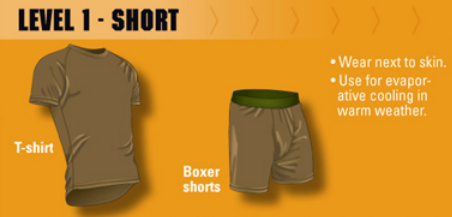
PCU: Crew neck silkweight T-Shirt and Silkweight boxer shorts
Made of durable, silkweight Polartec Power Dry fabric.
Level 1 Long
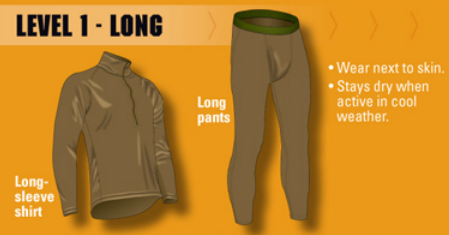
ECWCS III: Long-sleeve silkweight Top and silkweight Long Underwear (Polartec) Tru-Spec Top, Tru-Spec Bottom
Made of durable, silkweight Polartec Power Dry fabric.
Level 2

ECWCS III: Long-Sleeve top and Long underwear (Power Grid or similar)
Rothco, MilitaryUniform, Splav Top, Splav Bottom, Tru-Spec Top, Tru-Spec Bottom
Made of Polartec Power Grid, a high efficiency gridded fleece.
Insulating Layers
Level 3
Adds warmth by adding space between layers and trapping air. They are very breathable and transport moisture to the outside.

Mid layer fleece jacket made of High-Loft, Polartec Thermal Pro
ECWCS III: Polartec Jacket, Rothco
PCU: Patagonia R2 hybrid design featuring Polartec Thermal Pro and Polartec Power Grid
Civilian: Mountain Hardwear
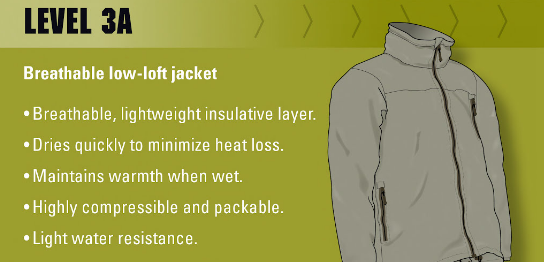
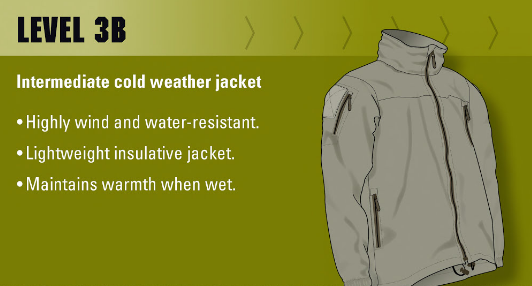
Soft Shells
Level 4
Levels 4 and 5 are used as an inner layer to trap heat and block wind, or as a water resistant outer layer.

Soft windshirt
ECWCS III: Fire resistant, ACU
Civilian: Patagonia Houdini jacket
Level 5

Softshell top and Softshell pant
PCU: pants Patagonia (Gen 2), Orc pants
Waterproof Hard Shell
Level 6 layers are only used during heavy rain or wet snow because even though they are made of Gore-Tex or other waterproof breathable membranes they trap moisture from inside. The principle of this clothing system is to transport moisture to the outside, and that is why the use of this shell is limited.
Level 6
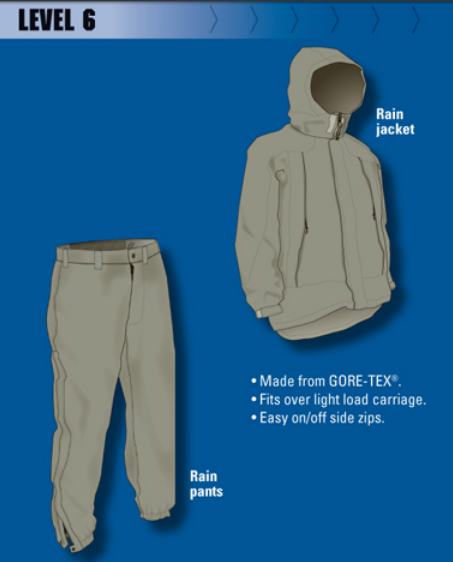
Hardshell top and Hardshell pant
PCU: Jacket Miltec, Pants Beyond,
Civilian: Patagonia Torrentshell Jacket and Torrentshell Pants, OR Foray Jacket, Marmot Jacket, Marmot Pant
Outer Insulating layers
Level 7
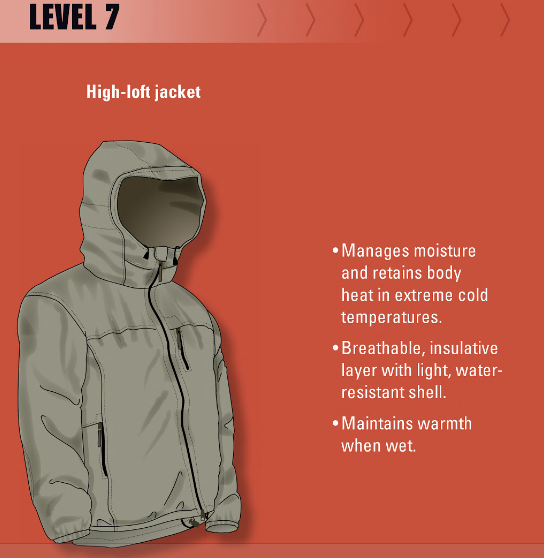
Insulated coat
ECWCS III: Primaloft jacket, Fire resistant set, Helikon Jacket
Civilian: Patagonia DAS Parka
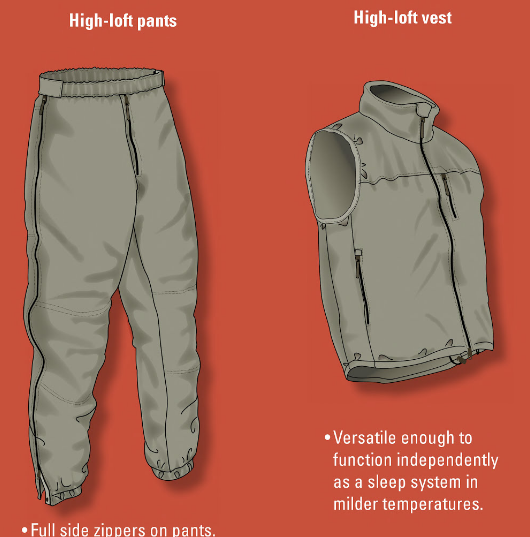
Insulated pants and Insulated vest
ECWCS III: Primaloft Pants, ADS pants, Fire resistant set
PCU: Wild Things pants
Civilian: Patagonia Nano Puff Vest, Primaloft Pants
Gloves
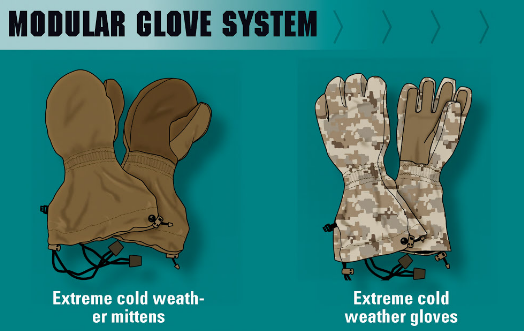
Extreme cold weather mittens and glove, Outdoor Research mitts, and gloves
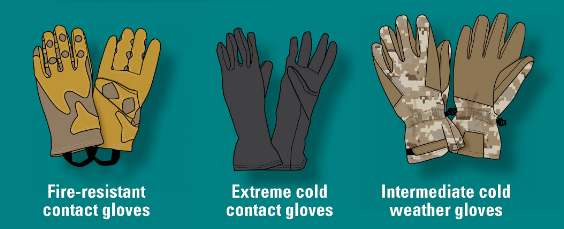
Fire resistant gloves, liner gloves and intermediate cold gloves
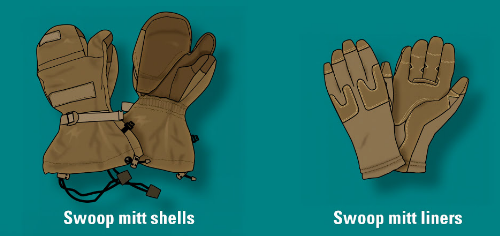
Headwear
Wearing two merino buff bandanas is more comfortable and versatile than wearing a thin balaclava. Additionally you can rotate the bandana when it is soaked in moisture to dry it out.
For very cold weather a double layer fleece beanie works great.
Footwear
For Two-season use:
Trail running shoes are ideal, Salomon XA Pro
Snow and shoulder season:
A waterproof mid shoe works great, Salomon XA Pro Mid Gore-Tex
Winter:
Neos Adventurer Overboots can be used over your shoes or with a thick boot liner for extreme cold.
Sources:
soldiersystems.net/2012/01/26/pcu-block-2-preview/
2fast-team.com/doc/vug_pcu.pdf
ontariogeardo.com/2011/12/pcu-buyers-guide.html
ontariogeardo.com/2011/12/protective-combat-uniform-pcu-history.html
itstactical.com/gearcom/apparel/comprehensive-guide-protective-combat-uniform/
ciehub.info/clothing/CW/PCU.html
militarymorons.com/gear/clothes.1.html
loadedpocketz.com/protective-combat-uniform-pcu-overview/
books.google.ca/books?id=CnjBAgAAQBAJ&printsec=frontcover#v=onepage&q&f=true
gearterra.com/blogs/pcu/protective-combat-uniform-pcu
webbingbabel.blogspot.ca/2016/02/patagonia-military-advanced-regulator.html
en.wikipedia.org/wiki/Extended_Climate_Warfighter_Clothing_System
soldiersystems.net/2008/11/10/outdoor-research-modular-glove-system/

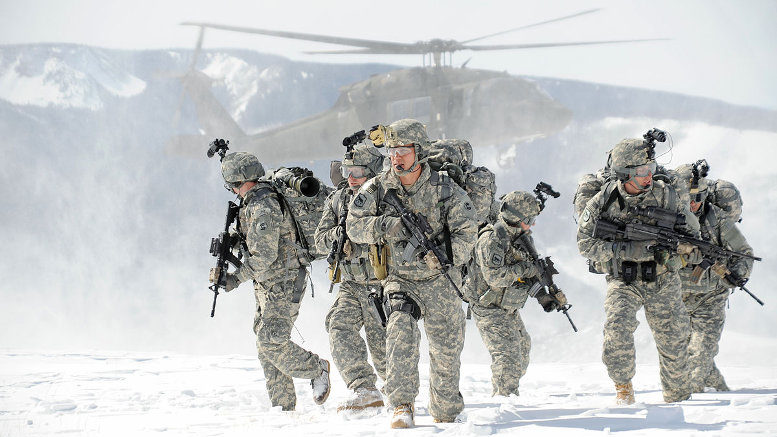





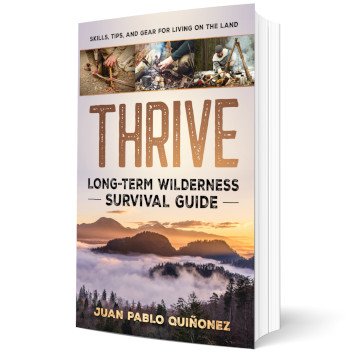
Thanks for the great post. Always asked myself about the meaning of all levels and now I know it.
Bought some great Patagonia Level 4, 5 and 6 PCU deadstock at AT EASE SHOP (www.at-ease-shop.com).
Keep up the good work!
Damn dude, this is a killer post. Thanks for all of the time you put into it. I can’t believe you even have sources for your research. Above and beyond.
Listing ROTHCO as a source of USGI Level 3 fleece? All official USGI ECWCS garments must be made in the USA by federal statute. ROTHCO garments are from outside the USA. How could you not know that?